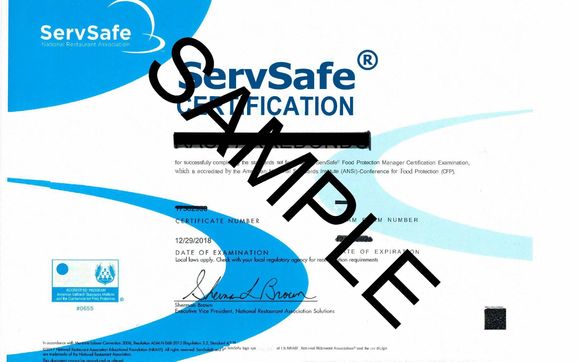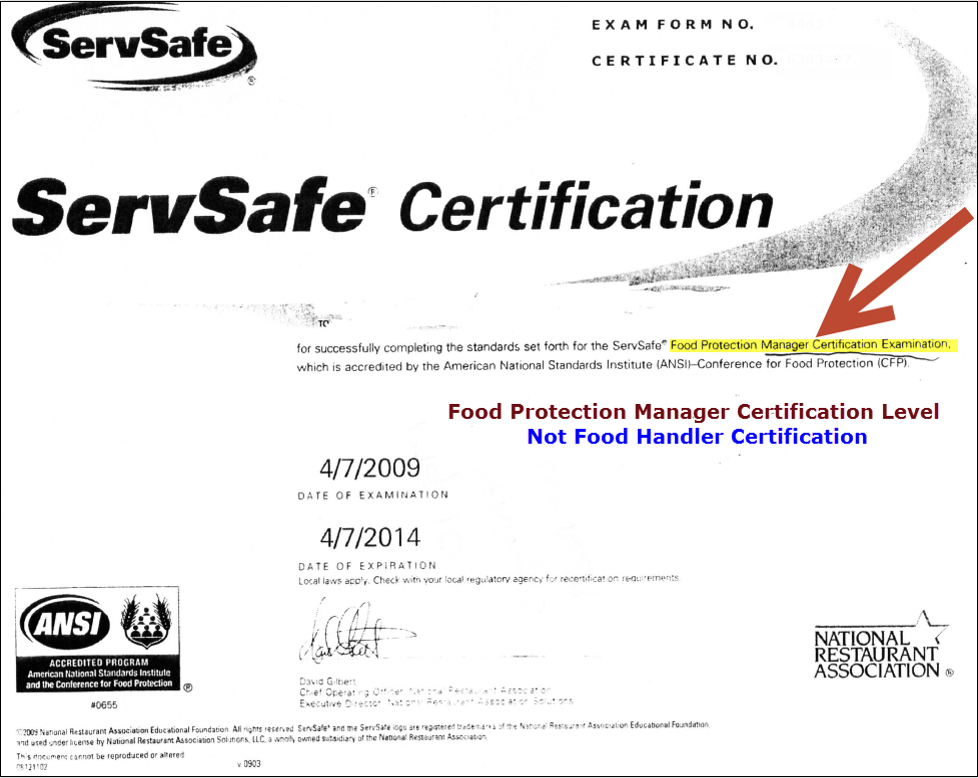What You Must Learn about the ServSafe Manager and Its Impact on Your Business
What You Must Learn about the ServSafe Manager and Its Impact on Your Business
Blog Article
Professional Training for Food Supervisor Accreditation Made Simple
The value of food manager qualification can not be downplayed, specifically in an era where food security is paramount. Professional training programs have actually developed to simplify the certification procedure, giving vital expertise and useful abilities essential for effective food administration. These programs cover essential topics, from foodborne ailment avoidance to compliance with health and wellness laws. However, real value of this training prolongs past plain certification; it has profound ramifications for job development and public health and wellness. Comprehending exactly how these components adjoin might disclose possibilities that are often neglected.
Importance of Food Supervisor Qualification
The value of Food Supervisor Accreditation can not be overstated in today's food service industry. This certification signifies that food supervisors have the necessary understanding and skills to ensure food safety and security, keep health and wellness standards, and copyright governing conformity. In an era where foodborne illnesses can have extreme repercussions, the role of a qualified food manager becomes critical in guarding public health and wellness.
Food Supervisor Accreditation not only outfits individuals with the knowledge to identify and minimize food security risks yet likewise boosts the integrity of the establishment. Consumers are increasingly critical; they seek guarantee that their dining experience is hygienic and secure. Certification functions as a mark of professionalism and reliability that can bring in and keep consumers.
Additionally, a licensed food manager can lead staff training, fostering a culture of safety and security and accountability within the workplace (ServSafe Manager). Investing in Food Supervisor Accreditation is a financial investment in quality, safety, and the overall success of food solution procedures.
Summary of Specialist Training Programs
Expert training programs for food manager certification are developed to supply comprehensive education on food security techniques, governing conformity, and danger monitoring. These programs intend to equip food solution experts with the knowledge and abilities essential to ensure secure food handling and preparation in numerous setups, consisting of restaurants, catering solutions, and institutional food procedures.
Generally, specialist training programs encompass both theoretical and sensible parts, allowing individuals to engage with real-world circumstances. The educational program typically includes crucial subjects such as foodborne ailments, appropriate food storage techniques, hygiene procedures, and worker training approaches. In addition, these programs are regularly updated to straighten with the current industry standards and laws, making sure that individuals get existing and appropriate information.
Lots of programs use versatile shipment techniques, including in-person courses, online training courses, or a hybrid approach, satisfying different discovering preferences and routines. Upon effective completion, participants generally get qualification, which is usually acknowledged by regional health departments and regulative agencies, enhancing their occupation leads within the food solution market. In general, professional training programs play an important duty in fostering a culture of food security and compliance among food managers and staff.
Secret Topics Covered in Training
Food safety and security is an essential focus in food manager accreditation training, including a variety of important subjects that make certain individuals are well-equipped to deal with food safely. Among the primary subjects covered is the significance of individual hygiene, that includes correct handwashing strategies and the value of maintaining cleanliness in food preparation areas.
Furthermore, the training addresses foodborne illnesses, detailing the different virus that can pollute food and the signs and symptoms related to these ailments. Participants learn more about the problems that advertise microbial development, which is important for preventing episodes.
Temperature level control is another key subject, highlighting the risk-free cooking, cooling, and storage space temperature levels essential to reduce threats. The training likewise covers cross-contamination avoidance strategies, ensuring that raw and prepared foods are dealt with suitably to stay clear of damaging communications.
Additionally, food security guidelines and standards, such as those set forth by the FDA and regional wellness divisions, are discussed to supply an extensive understanding of compliance demands. Finally, reliable parasite control procedures are examined to secure food establishments from infestations that can endanger security. Jointly, these topics lay a solid check this site out structure for safe food monitoring methods.
Advantages of Specialist Training
How can skilled training improve food safety and security techniques within an establishment? Professional training outfits food managers with thorough expertise of food security regulations, industry requirements, and finest practices. This foundational understanding is vital for preserving a secure and clean cooking atmosphere, eventually minimizing the risk of foodborne illnesses.
Furthermore, expert training fosters a proactive strategy to food security by stressing preventive steps and hazard evaluation. Managers educated by market professionals can successfully identify potential risks and carry out methods to minimize them. This not just secures consumers but likewise enhances the facility's reputation and More about the author credibility.
Additionally, expert training urges a society of continuous renovation. Food managers who involve in continuous education are much better prepared to adapt to new guidelines and fads in the food service industry. This flexibility can result in boosted functional effectiveness and cost savings.

Actions to Accomplish Certification
Achieving certification in food monitoring calls for a methodical method that encompasses numerous crucial steps. Individuals must select a certified training program that uses comprehensive coursework in food administration, security, and cleanliness principles - Manager Certification Training. These programs often supply important sources, consisting of research study products and practice examinations
Following, prospects ought to proactively engage in the training sessions, whether in-person or on the internet, to enhance their understanding of important subjects such as foodborne ailments, individual health, and correct food storage space next methods. Participation in conversations and functional exercises can additionally reinforce discovering.

As soon as sufficiently prepared, candidates can take the test and set up. Successful completion normally requires achieving a details passing rating, which shows a detailed grip of food security criteria.
Conclusion
In summary, professional training for food manager accreditation plays an essential duty in ensuring food safety and security and conformity with regulatory standards. Ultimately, accomplishing food manager accreditation via professional training not only elevates private competencies however additionally promotes a safer food setting for all.

Expert training outfits food supervisors with thorough knowledge of food safety and security guidelines, industry requirements, and best methods.In summary, professional training for food supervisor qualification plays an important function in making certain food safety and security and conformity with regulatory standards (Safe Serve Manager). Ultimately, attaining food supervisor qualification through professional training not only elevates individual proficiencies but additionally promotes a safer food atmosphere for all
Report this page